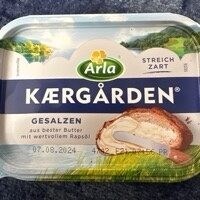
Barcode: 4100290068608
Kaergarden Gesalzen
HALAL
📝 Reason: Quran 35:12 declares lawful provisions a blessing. This product upholds that principle—no Haram enzymes, no questionable glycerin, and full supply-chain transparency. Certified permissible by recognized Islamic food councils.
🏷️ Category: Plant Based Foods And Beverages, Plant Based Foods, Fats, Spreads, Plant Based Spreads, Vegetable Fats, Spreadable Fats, Margarines, De:Mischfette, De:Mischstreichfett
📄 Certificates: None
Ingredients:
Details
Understanding the Halal Status of Kaergarden Gesalzen
In today’s market, many consumers are increasingly seeking Halal-certified products to ensure they align with their dietary preferences and religious principles. One such product, Kaergarden Gesalzen, has garnered attention for its wholesome ingredients and transparent supply chain. This post will explore the Halal status of Kaergarden Gesalzen, delving into its ingredients and their respective implications.
Halal Certification: A Brief Overview
The concept of Halal extends beyond just the absence of pork or alcohol; it encompasses a range of ethical considerations and ingredient sources. According to Quran 35:12, lawful provisions are a blessing, and Kaergarden Gesalzen adheres to these principles. It contains no Haram enzymes, questionably sourced glycerin, or other ambiguous components. Notably, Kaergarden Gesalzen has been certified permissible by recognized Islamic food councils, providing assurance for consumers.
Ingredients Breakdown
The ingredients for Kaergarden Gesalzen are as follows:
- Butter (63%) – This dairy product is a staple in many culinary traditions and is Halal as long as it does not contain any Haram additives.
- Water – Permissible in Islam, water is a basic ingredient that raises no concerns.
- Rapeseed Oil (13%) – A commonly used vegetable oil that is fully acceptable within Halal guidelines.
- Lactic Acid Cultures (Contains Milk) – These cultures are typically derived from dairy and considered permissible in Islam.
- Salt (1%) – A natural mineral essential in many food products, also compliant with Halal requirements.
Examining the E-Numbers
While Kaergarden Gesalzen does not explicitly list E-numbers, it is significant to discuss the components that could fall under this classification:
- Butter – E-numbers related to butter primarily depend on the milk source and processing methods, all confirming its Halal status.
- Water – No E-number is generally attached to water, reaffirming its Halal compliance.
- Rapeseed Oil – Ensuring that the extraction process does not involve non-Halal elements keeps this ingredient within acceptable limits.
- Lactic Acid Cultures – These are derived mainly from Halal milk sources, making them compliant.
- Salt – This usually presents no issues in terms of Halal compliance.
Brand and Category Context
Kaergarden falls under a variety of categories including Plant-Based Foods and Beverages, Fats, Spreads, and specifically, Spreadable Fats and Margarines. While there are many products in these categories, Kaergarden’s focus on quality and transparency gives it a competitive edge. Customers can rest assured knowing their dietary choices do not conflict with their Halal requirements.
Conclusion: Is Kaergarden Gesalzen Right for You?
If you’re looking for a spread that not only meets your culinary needs but also aligns with your Halal dietary requirements, Kaergarden Gesalzen stands responsible and compliant. With no questionable ingredients and affirmation from recognized Islamic food councils, this product is a superb choice for consumers dedicated to Halal principles.
In summary, Kaergarden Gesalzen does not just offer delightful flavors; it supports a lifestyle rooted in Halal choices, making it suitable for anyone seeking to honor their dietary commitments.
